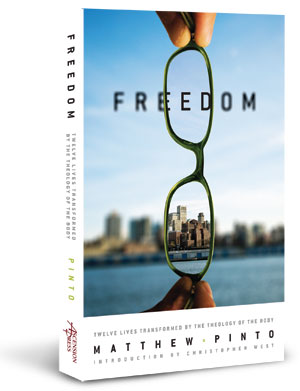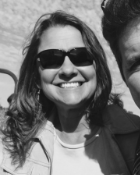Theology of the Body…
The phrase sounds so… intellectual. It makes one think of lofty religious ideology, spirituality, and maybe even a type of mysticism associated with marital union. Pedagogy. Instruction. Philosophy. Hard to understand. Need my glasses. Yikes! Way too much for the average person to digest. Right? Wrong!
“Theology of the Body” may seem like a lofty term at first glance, but really it is not that complicated. It is simply Pope John Paul II’s integrated vision of the human person – body, soul, and spirit….” [i] The term and subject matter of “Theology of the Body” is based on a series of 129 lectures that the pontiff gave during his Wednesday lectures from September 1979 to November 1984. The lectures included discussion of the Christian ideal and sacrament of marriage, contraception, celibacy and virginity, resurrection of the body, and adultery. This is all-inclusive material for sure, but fascinating, understandable and certainly very relevant for every Catholic.
 Numerous resources are available for those hoping to dive into a comprehensive study of the “Theology of the Body” [ii] (see below) but there aren’t a whole lot of books which delve into the actual experiences of those who are trying to integrate that theology into their lives. Freedom: Twelve Lives Transformed by the Theology of the Body (Ascension Press), by Matthew Pinto is a book that does.
Numerous resources are available for those hoping to dive into a comprehensive study of the “Theology of the Body” [ii] (see below) but there aren’t a whole lot of books which delve into the actual experiences of those who are trying to integrate that theology into their lives. Freedom: Twelve Lives Transformed by the Theology of the Body (Ascension Press), by Matthew Pinto is a book that does.
In Freedom (aptly titled on account of the individuals who finally find freedom from sin and a wounded life) best-selling author Matt Pinto brings together seemingly unlikely persons to illustrate chaste- living and a proper male/female sexual attitude. By sharing the stories of an ex-pornography addict, a woman who sold her body for money, a former teen mom and others, he demonstrates how God’s transformative grace can offer hope to everyone. Each story chronicles the struggles of an individual in a distinctive life situation as he or she comes to grips with what God intends for human sexuality and love. In the end, all realize that the message of the “Theology of the Body” is the key to understanding their purposes in life, and their lives are much richer for it. Their journeys to understand what the “Theology of the Body” means to them personally is the way they find true happiness and true freedom.
One part of Christopher West’s introduction particularly spoke to me. Let me share it here:
I can remember from a very early age being amazed by the differences between the sexes. When that God-given curiosity is not met in healthy, holy ways—that is, with a proper ongoing formation in God’s glorious, beautiful, wonderful plan form making us male and female—we inevitably seek to satisfy that curiosity in unhealthy, unholy ways. That is the story of my childhood and teen years in a nutshell. Having been ‘evangelized’ by the likes of Hugh Hefner, I followed what the world told me would satisfy my hunger. The wounds from several years of unchaste living, however, would catch up with me in college. The fervent prayers of my mother were eventually answered when at the age of 20, after a painful breakup with a long-time girlfriend; I experienced a profound encounter with Christ and returned to the practice of the Catholic faith. …(p. xi) So at the age of twenty one, I devoted myself to an intense study of all the key texts of Scripture that spoke of God’s plan for making us male and female and calling us to become “one flesh”.
Several things struck me about this excerpt:
- The commonness of West’s experience of “falling into” pornography because of the culture.
- The exceptional fact that by age 21 he realized something was terribly ‘off’ in his approach to sexuality and at that point decided to intensely study the Church teaching on the subject.
- That he feels the prayers of his mother affected his conversion.
The first point illustrates the state of the fallen world, and that so many people fall prey to society’s secular and ‘modern’ definitions of sex and love. The second demonstrates what God’s grace can do in a very short time. The third point fortified me in my desire to continue to pray for each one of my nine children daily, not knowing what temptations and struggles they may be experiencing at any given moment.
If West’s introduction intrigued me, the stories following his prologue blew me away. Each honest and riveting story illustrated time and time again the first two points mentioned above – how easy it is to fall into sin and how God’s merciful love can pull even the most hardened or wounded soul out. Another fact I noticed is how sins have a social consequence. The abuse of a child, for example, not only violates the child physically and emotionally at the time but also opens the door to hurting her in the future – for her decisions can spiral into negative ones on account of her early experiences. Wounded, she has no frame of reference for healthy living. And so, the perpetrator of abuse not only inflicts wounds on a child’s body immediately but also on his spirit and soul in the future. This is a grave moral evil.
I initially opened Freedom: Twelve Lives Transformed by the Theology of the Body, fearful that I might be delving into some abstract theological philosophy. I shouldn’t have worried. The book is relevant, easy to read and inspiring. It demonstrates the power of God’s grace in everyday people and allows readers to see that no matter how entrenched they may be in sexual sin or a distorted view of the male/female relationship, it is always possible to attain true freedom with Christ.
Footnotes:
[i] http://www.theologyofthebody.net/
[ii] Excellent “Theology of the Body” resources can be found here: http://www.ascensionpress.com/shop/Scripts/prodListView.asp?idCategory=45
Please help us in our mission to assist readers to integrate their Catholic faith, family and work. Tell your family and friends about this article using both the Recommend and Share buttons below and via email. We value your comments and encourage you to leave your thoughts below. Thank you! – The Editors











